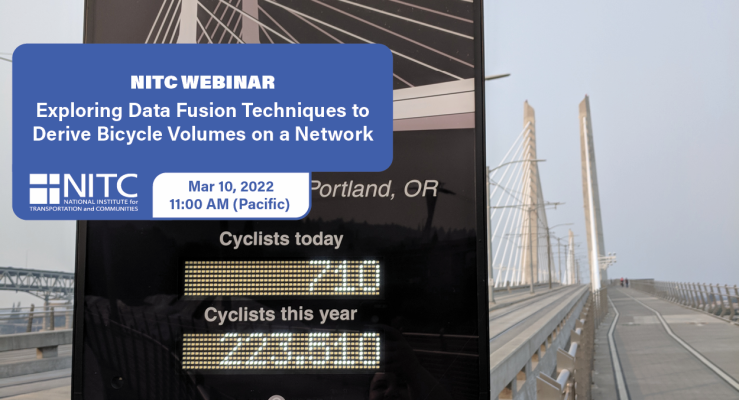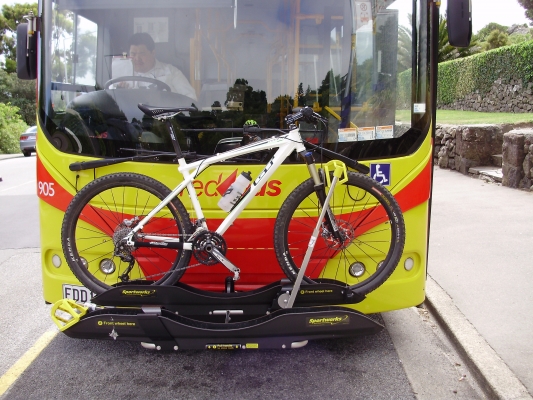PRESENTATION ARCHIVE
OVERVIEW
Planners and decision makers have increasingly voiced a need for network-wide estimates of bicycling activity. Such volume estimates have for decades informed motorized planning and analysis but have only recently become feasible for non-motorized travel modes.
Recently, new sources of bicycling activity data have emerged such as Strava, Streetlight, and GPS-enabled bike share systems. These emerging data sources have potential advantages as a complement to traditional count data, and have even been proposed as replacements for such data, since they are collected continuously and for larger portions of local bicycle networks. However, the representativeness of these new data sources has been questioned, and their suitability for producing bicycle volume estimates has yet to...
Read moreThe video begins at 1:19.
View slides
Summary: Where and when does overcrowding happen on TriMet's bus network? Which routes have the best on-time performance? Portland State University and TriMet have collaborated to make this kind of data available to anybody through Portal, PSU's transportation data archive for the Portland/Vancouver region. This presentation will cover the use of General Transit Feed Specification (GTFS) data for mapping TriMet’s performance data and the development of Portal’s innovative transit application. In the MAP-21 era of performance management, see how tools like Portal can support enhanced agency decision-making as well as community engagement.
Bio: Jon Makler researches and teaches about transportation planning and engineering at Portland State University. His research portfolio centers on intelligent transportation systems, including how they can be harnessed to benefit the environment and how the data they generate can support operational strategies and planning decisions. Since moving to Oregon 9 years ago, he has worked at Metro, the City of Portland and OTREC, the federally-funded research center housed at PSU. His previous employers were the North Jersey Transportation Planning Authority, the Harvard Kennedy School, IBI Group and Sarah...
Read moreThe video begins at 2:21.
Abstract:
Adaptive signal systems have been deployed in a number of locations across the country though their high maintenance requirements and additional cost have limited their widespread use. Adaptive systems adjust phases and timings at a network of signals in real time to improve traffic operations, particularly along congested corridors.
Rhythm Engineering has developed a new video detection-based system that vastly reduces the cost of deployment and maintenance. However, no existing microsimulation software could model the system due to its innovative methodology.
The methodology involves doing away completely with concept of cycle lengths, splits, and offsets, key parameters use in traffic signal analysis today. HDR and Rhythm Engineering joined together to develop a tool to act as middleware between the adaptive system and VISSIM that would emulate video detection, send the "video" to the adaptive controller, run the adaptive controller algorithm, and transmit detector calls back to VISSIM for inclusion in the model.
This presentation will discuss the lessons learned in the development of the emulation of video detection within VISSIM as well as showing the improvements in traffic operations provided by the system. It will also discuss the implications of the system's architecture and the impact it will have on not only adaptive signal systems...
Read moreWatch video
View Nicholas Stoll's presentation slides
View Nicholas Kobel's presentation slides
Nicholas Stoll, Graduate Research Assistant, Portland State University
Topic: Utilizing High Resolution Bus GPS Data to Visualize and Identify Congestion Hot-spots in Urban Arterials
The research uses high resolution bus data to examine sources of delay on urban arterials. A set of tools were created to help visualize trends in bus behavior and movement, which allowed for larger traffic trends to be visualized along urban corridors and urban streets. By using buses as probes and examining aggregated bus behavior, contoured speed plots were used to understand the behavior of roadways outside the zone of influence of bus stops. These speed plots can be utilized to discover trends and travel patterns with only a few days’ worth of data. Congestion and speed variation can be viewed by time of day and plots can help indicate delays caused by intersections, crosswalks, or bus stops.
This type of information is important to transit authorities looking to improve bus running times and reliability. Congested areas can be detected and ranked. Speed plots...
Read more

